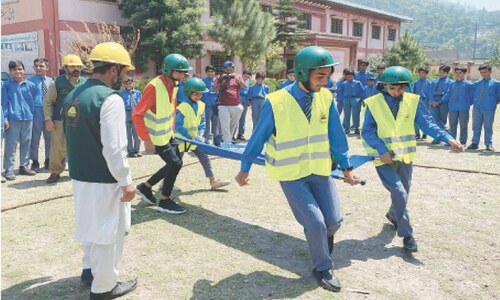A good move for Balochistan
I couldn't agree more with the editorial "A good move for Balochistan" (August 25) that the province should be developed and the life of the Baloch be improved. But I think the editorial should have also mentioned the role tribal leaders have played in keeping Balochistan underdeveloped.
The oil and gas companies - whether they are private, multinational or semi-government - have to invest a certain amount of money every year, firstly for the development of infrastructure in the area and, secondly, on the education of locals (according to the agreements they sign with the government).
In Balochistan, tribal leaders are paid out these amounts and much more which all of us know go straight into their own pockets.
UMAR AFTAB
Rawalpindi
(2)
As we are accustomed to military rule, we do not see any danger to Pakistan. But the recent incidents of terrorism in quick succession - the Quetta killings, the attack on the convoy of the corps commander in Karachi, the sectarian killings by direct and suicide attacks on mosques and imambargahs in Karachi and the killing of five army personnel in Khuzdar, followed by an attack on the chief minister of Balochistan during his tour of Khuzdar - appear to be a bad omen for this country. The responsibility for the Khuzdar attack was claimed by an organization called the "Balochistan Liberation Army".
However, let us agree that the present army-sponsored government has not been able to control the law and order situation. But the dismal situation of peace is due to the negligence of the intelligence and law-enforcement agencies, which are not equal to the task.
Another important point to consider is the sense of deprivation among the smaller provinces which has led to the formation of the Pakistan Oppressed Nations Movement which includes all those who claim to be oppressed sub-nationalities.
These people are annoyed by the operation in Turbat and consider it inimical to their interests. Negotiations on all matters of discord, disputes and deprivation can resolve issues between the federation and the provinces.
Dr SYED ABU JAFFAR
Karachi
Social role of folk music
I am an admirer of Ustad Amanat Ali Khan and cherish the treasure that the late Ustad left behind in recorded form. As an amateur singer I keep reciting his famous thumri: Laagee re tau se laagee, najar sayyan laagee.
For reasons best known to himself, Ustad Amanat Ali Khan kept this thumri short to just one verse and one stanza. Later, some time Sudarshan Singh Pandit is said to have added one more verse to the thumri. It goes as:
Sang kee saheli poochhey, kahan gaye rassiya
Baat hamari jaane, Brij ki sakhiyan
Maare sharam ke main bhagee
Laagee re tau se laagee, najar sayyan laagee.
Bravo is the only compliment that can be given to Sudarshan Singh Pandit for making such a beautiful addition within the parameters of the original composition.
Now there is something more serious. I am struggling with a recent thought and wish to adorn Ustad Amanat Ali Khan's thumri with two more stanzas that constitute a purpose, a message against karo-kari incidents. They are as follows:
Sakhiyan sang boli to main, par dil kee baat na kholi
Pyaar ko paap samajhne waale, kis ki bharenge jholi,
Pyaar ko pyaar kahan milta hai, bas milti hai goli
Dil se mayl nikaalo logo, bolaa baba raagee
Laagee re tau se laagee, najar sayyan laagee
Kaun hai preetam mera eeh gal koi kadi na jaane
Milna sadda aukkha mushkal, asi apney bhaag pechane
Sang waseda hoya vee, te tabbran dee barbadi
Rab preetam noo jeenda raakhe, taan te hoi main bhaagee
Laagee re to se laagee, najar sayyan laagee.
These lines advise restraint to lovers for the sake of harmony among all rather than provocative action. And this is exactly the message for young hearts who passionately listen to folklore.
History tells us that social problems are commonly solved by thinkers and poets alike, suggesting to the masses a change of attitude. Through these columns I request Ustad Asad Amanat Ali, the successor and heir to the late Ustad Amanat Ali Khan, to give his approval to the aforesaid additions to the thumri.
All singers may then sing the additions to make it a long melody going well over half an hour, as well as deliver the message contained in these words against karo-kari.
M. M. KHAN
Karachi
Ban on kite-flying
These days we observe that every weekend people fly kites throughout Lahore city. Power shutdowns, road accidents, people falling from rooftops, etc., are again becoming common.
Frequent electrical shutdowns and power fluctuations increase the cost of production, thus making our industry inefficient. Moreover, these power disruptions damage electrical machinery, raising their cost of maintenance. This further increases the cost of the final product, thus making our industries non-competitive.
These problems also affect our life at home when domestic appliances are damaged or their efficiency decreases as a result of frequent power failures or power fluctuations. The economic loss is one aspect of the problem; there is also the loss of human limb and life.
A major problem occurring as a result of kite-flying is the danger posed to light aircraft. The razor-sharp metal wire used in kite-flying has damaged many times the aluminium structure of light aircraft. Local flying clubs have made several complaints to the police about the matter, but to no avail.
The present change of policy from a permanent ban to a partial ban shows that the government is not serious about the problem. Fields from where kite-flying is done should be turned into sport fields. Also, there should be a ban on the sale of kites. Shopkeepers who break the rule should be punished. In short, there should be a round-the-year ban on kite-flying.
ADNAN LATIF
Lahore
Travelling to Hawkesbay
The drive to Hawkesbay is a daunting task. Firstly, one has to tackle traffic jams at the intersection where you have three roads meeting: one going towards SITE area, another towards Lyari, and the third one towards the Maripur Air Force base, from where another road goes to Hawkesbay.
Traffic congestion at this intersection is primarily due to a flyover being constructed between the Lyari bridge and SITE. This shows lack of transitional traffic management.
All it requires is a little care on the part of the road works division to work with the traffic police in maintaining the normal flow of traffic for the duration of the construction.
Once you get through this intersection, the next challenging area is at a truck stand, where especially during the late hours of the morning and evenings, both on weekdays and weekends, one can expect to get stuck in a traffic jam due to trucks entering and leaving the stop. The situation here is similar to the situation in Lyari.
A prudent approach would be to shift the truck stand from its present location to a location on the outskirts of Karachi, somewhere near either the Super Highway or the National Highway. Will the authorities concerned ensure that the construction of the flyover does not cause traffic jams?
ABDULRAHMAN RAFIQ
Karachi
Polygamy
I disagree with Jaffer Wafa ("A case against polygamy", August 12) that since the word "from amongst yatama" do not appear in the text of Surah Nisa and in the translation of Pickthall, it follows that the permission to remarry is for any woman (other than yatama). This is clearly the logical fallacy of the non sequitur.
The context, the sequence, the self-consistency and the compatibility of the Holy Quran clearly imply that the conditional provision for polygamy is only for widows and orphans and is applicable in such prevailing social circumstances where widows and girl orphans need protection (e.g., as a result of war because of which women 'outnumber men).
PROF. RAZIA YAQUB
Karachi
Resurrecting Chaudhri Rehmat Ali
Chaudhry Shujaat Hussain's brief stint in office will be remembered for two things: bringing on the books a law that can only work against a free press and taking steps to exhume Chaudhri Rehmat Ali's remains from Britain and bringing them back to Pakistan. The first decision shows lack of concern for press freedom, the second lack of knowledge about history.
Chaudhri Rehmat Ali's claim that he coined the word Pakistan has always been disputed by Mohammad Aslam Khattak, who is alive and, if asked, will reaffirm his claim that he it was who came up with the acronym Pakistan.
Chaudhry Rehmat Ali is buried in Cambridge because that is where he chose to live instead of Pakistan which he denounced in language of the vilest abuse. He used even harsher words for the founder of Pakistan, Quaid-i-Azam Mohammad Ali Jinnah.
In 1933, Chaudhri Rehmat Ali wrote a pamphlet called 'Now or Never'; it bore three signatures, one of the signatories being Aslam Khattak. He criticized Iqbal for proposing an Indian federation in which the Muslims would be a minority.
He castigated other Muslim leaders whom he called camp followers of British imperialism and blind imitators of Congress who had placed the Muslims at the mercy of British imperialism and caste Hindu nationalism.
Since all Muslim leaders had failed, he wrote, "Allah has assigned that fateful task to me, that He commanded me to do it; that He wanted me to challenge the might, to oppose the Indian federation, to propose the Islamic federation." He called his mission divinely inspired.
In Rehmat Ali's concept of Pakistan, every non-Muslim was to remain subservient to the master race he called The Paks. And, yes, the subcontinent was to be renamed Dinia. He did not say how he was going to bring all that about.
Exactly six days after the Muslim League's acceptance of the June 3, 1947, Plan, Rehmat Ali denounced the Quaid-i-Azam in venomous language. Ten weeks later, he published a pamphlet called 'The Greatest Betrayal' condemning the Quaid and the League for having written "the most shameful and treacherous chapter" in Muslim history.
He wrote that the Quaid had shattered the foundations of Muslim nationhood and sabotaged the future of 100 million Muslims living in the "continent of Dinia and its dependencies." He called on all Muslims to rise against Jinnah and "repudiate and nullify his treacherous plan."
Rehmat Ali said Mr Jinnah had dealt six "deadly blows" to the Muslims. He had destroyed Muslim unity, and paralyzed and battered Bengal and Assam, turning them into dominions bearing allegiance to "the King of Britain".
He had let the Hindus free to plan the "division, degradation and exploitation of the Millat." Mr Jinnah had surrendered Muslim shrines and mosques to the Hindus and turned Muslim victories of the past into defeats. He wrote that Mr Jinnah had not accepted Pakistan but "PASTAN, the shadow of Pakistan."
There is more but I will stop here with the observation that even the worst enemies of the Quaid and the Muslim League put together will not be seen to have heaped such abuse on him.
The Quaid, as was characteristic of him, simply ignored the outpourings of a confused mind. I hope if not Mr Shujaat Hussain, then PML information secretary, Sen. Tariq Azim, who we are told headed the committee that is said to have "finalized the arrangements" for bringing back Chaudhri Rehmat Ali's body, will read this and reconsider what he and his principals are doing out of ignorance.
KHALID HASAN
Washington DC, USA
(2)
Mr Kunwar Idrees in his letter (Aug 24) has called into question the decision of the government to bring back the remains of Chaudhri Rehmat Ali from the UK to Pakistan on the grounds that it will detract from the part that Mr Jinnah played in the creation of Pakistan. He has also given some further reasons for his viewpoint, to wit:
- Chaudhry Rehmat Ali never won approbation for his part in the Pakistan Movement from Mr Jinnah.
- He is reported to have made some scathing remarks about the "truncated" Pakistan that Mr Jinnah agreed to accept.
There is no doubt that Rehmat Ali was bitterly critical of Mr Jinnah for accepting certain provisions of the partition plan, and regretted the loss of half of Bengal, Punjab, Assam and Kashmir. Yet his contribution to the idea of Pakistan cannot be denied.
He was the secretary of the Pakistan Society formed by some Cambridge students in the early '30s, and this society was formed at the instance of Maulana Abdul Majeed, Imam of the Woking Mosque and editor of the Islamic Review, London, who challenged these youngsters to show some action during their post-lunch discussion of Allama Iqbal's Allahabad address.
And it was at one of the first meetings of his society that the term "Pakistan" (in fact, the first name given to the new country was "Pakstan" and the letter 'i' was added later on) was coined.
To get a full picture of the whole historical drama I would advise Mr Kunwar Idrees to see K.K.Aziz's books "Chaudhary Rehmat Ali" and "The History of the Idea of Pakistan".
The whole story of the formation of this society has been recorded by Khwaja Salah-ud-din Ahmad in the Light of Lahore. Khwaja Salah-ud-din was a member of this society and so was Dr Jahangir Khan, the famous cricketer.
CAPT. ABDUS SALAM KHAN
Rancho Cucamonga, CA., USA
Why Aasim Kamal is ignored
The poor performance of the Pakistan A cricket team in Kenya is reported to be attributed by the chief selector, Wasim Bari, mainly to the very low fitness level of the players. The question is: why did he not consider the fitness level of each player before he made the selection?
Mr Bari did not select Aasim Kamal for the A team on his perception that Kamal is only a Test batsman. Does he not remember that in the early days of Saeed Anwar's cricketing career, many pundits had declared him good only for one-dayers but how wrong they were? Was Aasim Kamal given any opportunity to prove himself in one-dayers? Hardly any.
His selection in the squad for the tournament in Kenya, especially when there are not many hot batsmen in the A team, would have given him a fair chance to prove or disprove Bari's assumption, and may very well have made ours a winning team.
Wasim Bari was Pakistan's best wicket-keeper and indeed a fine person, but his abilities in matters of selection are very unimaginative and uninspiring. Should those who run the cricketing affairs not rise above petty politics and, for Pakistan's sake, approach Imran Khan and Omar Kureshi to help in team selections and managing the Pakistan Cricket Board?
ILYAS ANWAR
Richmond, USA
SPSC's exams
It is regrettable that the Sindh Public Service Commission has not been fair in conducting the viva-voce of the combined competitive examinations, 2003-04. For example, a candidate has been recommended by the commission for the post of deputy district officer (BPS-17), but according to the written test he had failed.
Moreover, the final viva-voce results announced on June 28 are not being issued. This delay gives rise to apprehensions. It is imperative that an inquiry is conducted into the matter and the record of the written test is also handed over to the Federal Public Service Commission for investigation.
Also, the result of the viva-voce may be cancelled, and all candidates may be interviewed again by an impartial committee.
HAFIZ ABDUL JAMIA
Sukkur
Economists on both sides
Mr Shaukat Aziz's elevation as PM in Pakistan and that of Mr Manmohan Singh in India shows that the powers-that-be in both the countries have realized that the next era is of economy and economists (courtesy WTO).
Another point is that the chemistry of Mr Singh and Mr Aziz will definitely work, which will ultimately lead to stronger trade ties between the two South Asian countries.
AFZAL RAHIM
Peshawar
Americans' bias
I was always under the impression that the people of advanced countries enjoyed a higher level of rationality than us. So I was deeply shocked when a doctor friend of mine working as a resident-trainee in a Pittsburgh University Hospital in America was recently issued with a notice of termination of his service simply on a complaint by two American attending physicians who said that they did not like his demeanour.
When he asked for specific details of his faults so that he could rectify them, he got no answer. One can only conclude that bias, bigotry and fanaticism are more deeply entrenched in advanced societies than in so-called poor countries.
My friend who possesses a very amiable and cosmopolitan nature is destined to lose his career at the personal whim of two of his colleagues who happen to be American citizens and who just don't seem to like his looks.
ATIF ALI
Muzaffargarh
Musharraf's interview
It is heartening to note that upon the suggestion of the outgoing prime minister, a Senate committee is to be formed to find a way out of the ongoing crisis in Balochistan. It was quite a disappointment watching General Musharraf on PTV eulogizing his latest efforts to hunt 'terrorists' in Balochistan.
Unless political voices gain momentum, the solution to all our problems will be addressed by the gun. Trouble in Wana, shoot; agitation in Balochistan for the people's rights, shoot; protest for the tiller's right to land in Okara, shoot.
ASLAM MINHAS
Karachi
Climate change
The article by George Monbiot, titled "The truth about climate change" (Dawn, August 11), is very impressive and thought-provoking. His article includes the following, which should be an eye-opener for us:
"... the Himalayan glaciers which feed the Ganges, the Brahmaputra, the Mekong, the Yangtze and the other great Asian rivers are likely to disappear within 40 years." Is someone who matters listening and doing something in this respect?
MUHAMMAD SHABBIR
Gujrat














































